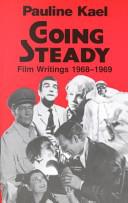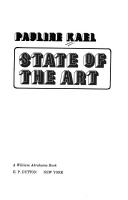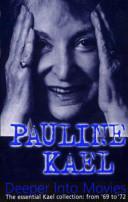Works
Famous Pauline Kael Quotes
"The Perils of Being Pauline" http://wrt102summer2005.blogspot.com/2005/07/pauline-kael-new-yorker-interview.html, interview with Francis Davis, The New Yorker (October 2001).
Interviews
“Irresponsibility is part of the pleasure of all art; it is the part the schools cannot recognize.”
Going Steady (1969), Trash, Art and the Movies (February 1969)
"Replying to Listeners" http://www.paulrossen.com/paulinekael/replylisteners.html, broadcast on KPFA (January 1963).
Review of Small Change, from When The Lights Go Down (Holt, Rinehart and Winston, 1980, ISBN 0-030-42511-5).
Pauline Kael Quotes about art
John F. Kennedy, address at the dedication of the Robert Frost Library, Amherst College, Amherst, Massachusetts (1963-10-26).
Misattributed
From "The Current Cinema" http://www.criterion.com/current/posts/834-last-tango-in-paris. The New Yorker. October 28, 1972.
“Kicked in the ribs, the press says "art" when "ouch" would be more appropriate.”
Going Steady (1969), Trash, Art and the Movies (February 1969)
Quoted in Francis Davis, Afterglow: A Last Conversation with Pauline Kael (Da Capo, 2003, ISBN 0-306-81230-4).
"Enter the Dragon," p. 221.
5001 Nights at the Movies (1982)
Pauline Kael Quotes about people
"The Perils of Being Pauline," interview with Francis Davis, The New Yorker (October 2001).
Interviews
Taking It All In (1983), Why Are Movies So Bad? Or, The Numbers (1980-06-23)
Taking It All In (1983), Why Are Movies So Bad? Or, The Numbers (1980-06-23)
"The Perils of Being Pauline," interview with Francis Davis, The New Yorker (October 2001).
Interviews
“The critical task is necessarily comparative, and younger people do not truly know what is new.”
Going Steady (1969), Trash, Art and the Movies (February 1969)
Pauline Kael: Trending quotes
Going Steady (1969), Trash, Art and the Movies (February 1969)
"Ersatz," review of Stand By Me (1986-09-08), p. 197.
Hooked (1989)
"Ladies of Leisure," p. 403
5001 Nights at the Movies (1982)
Pauline Kael Quotes
Going Steady (1969), Trash, Art and the Movies (February 1969)
Interview with Susan Goodman, Modern Maturity (March/April 1998) http://www.paulrossen.com/paulinekael/modernmaturity.html.
Interviews
"A Bad Dream/A Masterpiece," review of The Moon in the Gutter (1983-09-19), p. 48.
State of the Art (1985)
Going Steady (1969), Trash, Art and the Movies (February 1969)
Going Steady (1969), Trash, Art and the Movies (February 1969)
"The Sound of Music," p. 697
5001 Nights at the Movies (1982)
“I am mystified. I know only one person who voted for Nixon.”
Attributed to Kael after the 1972 American Presidential election, which Nixon won easily. This misquote is presumably based on "I live in a rather special world." above, but there is no evidence that Kael was mystified or surprised by that election's outcome.
Misattributed
Interview with Susan Goodman, Modern Maturity (March/April 1998).
Interviews
"Star Wars," p. 714.
5001 Nights at the Movies (1982)
Interview with Susan Goodman, Modern Maturity (March/April 1998).
Interviews
Going Steady (1969), Trash, Art and the Movies (February 1969)
"Another Part of the Forest," p. 30.
5001 Nights at the Movies (1982)
"Stanley Strangelove" (January 1972) http://www.visual-memory.co.uk/amk/doc/0051.html, review of A Clockwork Orange
Deeper into Movies (1973)
Going Steady (1969), Trash, Art and the Movies (February 1969)
Going Steady (1969), Trash, Art and the Movies (February 1969)
“If you can't make fun of bad movies on serious subjects, what's the point?”
Interview with Hal Espen, The New Yorker (1994-03-21); reprinted in Espen's Conversations with Pauline Kael (University of Mississippi Press, 1996, ISBN 0-878-05899-0), p. 162.
Interviews
Quoted by Israel Shenker, "Critics Here Focus on Films As Language Conference Opens," http://select.nytimes.com/gst/abstract.html?res=F50A11FF3E59107A93CAAB1789D95F468785F9 The New York Times (1972-12-28)
Often quoted as "How could Nixon have won? Nobody I know voted for him"; referring to George McGovern's loss to Richard Nixon in in the 1972 presidential election.
"Movies on Television"
Kiss Kiss Bang Bang (1968)
"The Sign of the Cross," p. 680.
5001 Nights at the Movies (1982)
"King Candy," review of Against All Odds (1984-03-19), p. 145.
State of the Art (1985)
"Hobson's Choice," pp. 335-336.
5001 Nights at the Movies (1982)
"New Age Daydreams," review of Dances with Wolves (1990-12-17), p. 295.
Movie Love (1991)
"Raising Kane" http://www.paulrossen.com/paulinekael/raisingkane.html, The New Yorker (1971-02-20 and 1971-02-27); reprinted in Kael's The Citizen Kane Book (1971).
"A Note on the Title".
Kiss Kiss Bang Bang (1968)
Going Steady (1969), Trash, Art and the Movies (February 1969)
Taking It All In (1983), Why Are Movies So Bad? Or, The Numbers (1980-06-23)
Taking It All In (1983), Why Are Movies So Bad? Or, The Numbers (1980-06-23)
"Mirrors," review of Places in the Heart (1984-10-15), p. 246.
State of the Art (1985)
Review for Shoeshine (1946) as quoted in Sontag & Kael: Opposites Attract Me (2004) by Craig Seligman.
"The Beachcomber," p. 56.
5001 Nights at the Movies (1982)
"The Wild One," p. 838.
5001 Nights at the Movies (1982)
Taking It All In (1983), Why Are Movies So Bad? Or, The Numbers (1980-06-23)
"Busybody," review of Silkwood (1984-01-09), p. 107.
State of the Art (1985)
“A mistake in judgment isn't fatal, but too much anxiety about judgment is.”
"Zeitgeist and Poltergeist; or, Are Movies Going to Pieces?" http://www.paulrossen.com/paulinekael/aremoviespieces.html (December 1964), from I Lost It at the Movies (1965).
Review of Casualties of War, p. 176.
Movie Love (1991)
"Drifters, Dopes and Dopers," review of 8 Million Ways to Die (1986-05-19), p. 156.
Hooked (1989)
Going Steady (1969), Trash, Art and the Movies (February 1969)
"The Iceman Cometh," pp. 353-354
5001 Nights at the Movies (1982)
“The action genre has always had a fascist potential, and it surfaces in this movie.”
"Dirty Harry," p. 191.
5001 Nights at the Movies (1982)
isn't believable for an instant.
"The Agony and the Ecstasy," p. 11.
5001 Nights at the Movies (1982)
"Le Mystère Picasso," p. 511.
5001 Nights at the Movies (1982)
"Movies on Television".
Kiss Kiss Bang Bang (1968)
"Duel in the Sun," p. 206.
5001 Nights at the Movies (1982)
The New Republic, December 24, 1966
"Potency," review of Born on the Fourth of July (1990-01-22), p. 254.
Movie Love (1991)
"Circus," review of Moscow on the Hudson (1984-04-16), p. 160.
State of the Art (1985)
As Simone Weil noted, it was the people with irregular and embarrassing histories who were often the heroes of the Resistance in the Second World War; the proper middle-class people may have felt they had too much to lose.
"Busybody," review of Silkwood (1984-01-09), p. 107.
State of the Art (1985)






